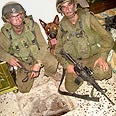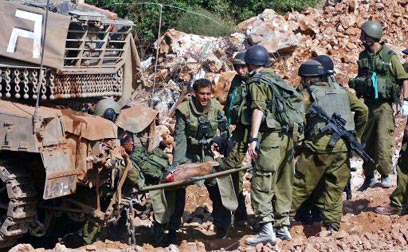

Yet five years after the bloody battle, the wounds remain open and bleeding. In the soldiers' recurring nightmares they are back in that village, with the screams, the fire coming from all directions – but they are no longer the same.
- Receive Ynetnews updates directly
to your desktop
Many of those men appealed to the Defense Ministry with a request to be recognized as shell-shocked soldiers. Depositions tell not only of the battle itself but of how the soldiers themselves saw things and the memories and nightmares that have accompanied them since that day. Most of them have been recognized as disabled IDF veterans and experts estimate that the list is set to get longer over the next few years.

Wounded soldiers evacuated from Bint Jbeil (Archives: Doron Golan)
"Post Traumatic Stress Disorder has no expiration date," explains a military official involved in the issue, "some soldiers feel distress as soon as the battle is over while for others it comes months or years later. At first, they repress the feelings, are embarrassed to turn to anyone but eventually it breaks out."
One soldier who was recently recognized as a PTSD victim by the Defense Ministry described the horrors of Bint Jbeil as he saw them: "On July 27 2006 I and my company happened upon a face to face battle with Hezbollah terrorists. During the battle which lasted for many hours the terrorists surrounded us, threw grenades at us and had us under intensive fire.
'We watched over bodies'
"There were 25 immobile wounded soldiers. I ran from a house into the field to respond and help; in the background were desperate calls for help, and we were under live fire, the killed soldiers' internal organs exposed, and blood in every direction."The soldier then went on to tell of how he lost his commanders and the bravery exhibited by assistant battalion commander Major Roi Klein who was killed when he jumped on a grenade to save his comrades.
"We watched over the bodies, we were crushed, we broke down and cried on each others' shoulders," He said adding, "I felt helpless and uncertainty over my fate and the fate of my comrades. "
The soldier claimed that the sights from that battle haunt him: "At first I tried to deal with it by myself. I was embarrassed to talk about it, I thought I was strong enough, I mean, I was a fighter, I didn't believe time would heal the mental wounds."
Eventually the opposite happened: "Sadly I was proved wrong, I have endless flashbacks and nightmares from the scene of the battle, anxiety, shuddering, and lack of ability to concentrate. I've become irritable, introverted, standoffish, unhappy."
Another soldier who experienced the battle of Bint Jbeil wrote: "The helplessness, the uncertainty…was seared into our minds, we were left mentally injured, and we were in terrible distress.
Soldiers seeking shell-shock recognition were examined by psychologists. One soldier was described by doctors as suffering from symptoms of depression, dealing with anger attacks and a low sensitivity threshold.

'We cried on eachothers' shoulders' (Archives: Reuters)
"I hear my the screams of my friends and myself screaming to take him out of the kitchen ruins," the soldier described in the deposition. His friend described a similar situation – saying he suffered from concentration problems, nightmares and impatience.
Many of the Bint Jbeil combatants suffer from significant consequences in various scopes of their daily life – finding jobs and fitting in school, relationships and simply functioning. The documentation reveals that the IDF has not offered any mental assistance after the war, something which could have decreased the scope and severity of the phenomena.
Commenting on the issue an IDF official said that one of the most important lessons learnt from the Second Lebanon War was that commanders, guided by a mental health officer, have started talking to their soldiers both before and after operations and battles, and in more complex cases referred them to professionals.
Not a simple process
"This system proved itself during Operation Cast Lead; we saw that the talks significantly reduce appeals to the battle response unit."While there are no official statistics over the number of appeals to the unit, officials and professionals noted that the numbers among the Bint Jbeil participants is high.
Lawyer Eli Saban who specializes in these cases said that he received many appeals from soldiers who took part in that battle.
"We've submitted a number of claims and soldiers received the recognition they deserved. There is no doubt that the battle 'gave birth' to additional claims because of the special circumstances. The burden of proof is on the soldier submitting the complaint, it isn't a simple process."
According to Saban, the fact that there is no time limit on submitting this kind of claim leads to the fact that new soldiers who can't deal with their situation keep popping up. "It's better that they ask for help than cause their situation to deteriorate," he added.
- Follow Ynetnews on Facebook















